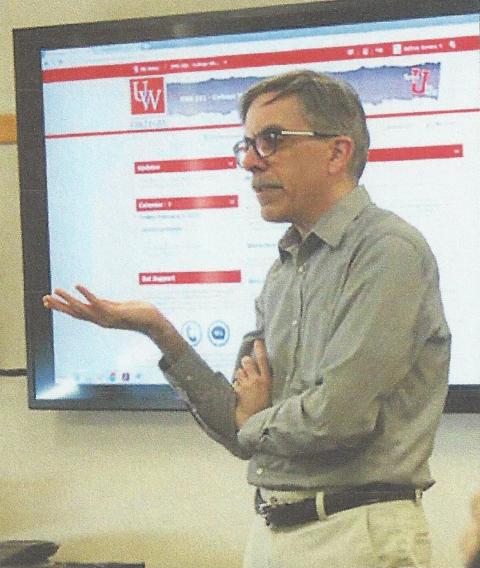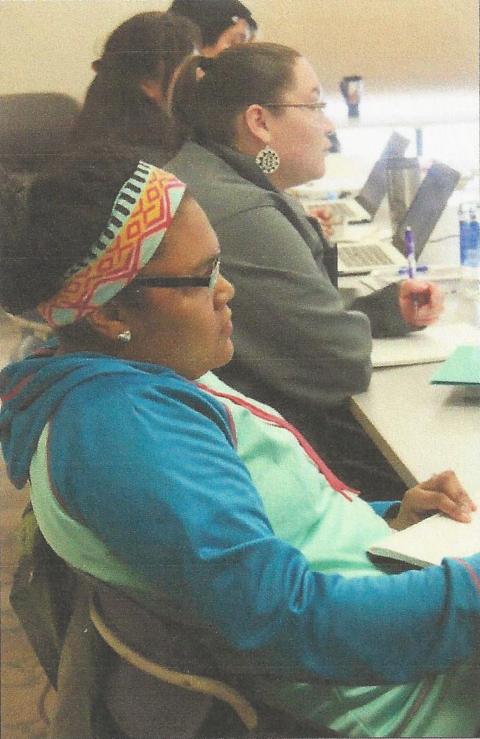 |
Canku Ota
|
 |
|
(Many Paths)
|
||
|
An Online Newsletter
Celebrating Native America
|
||
|
April 2016 - Volume
14 Number 4
|
||
|
|
||
|
Ho-Chunk Launch New
Language Programs
|
||
|
by Cassandra Colson
- Jackson County Chronicle
|
||
Language teachers Dana DeBoer and Gordon Thunder find joy in hearing their high school-age students speak Ho-Chunk. The language of the Native American tribe has seen a steady decline in fluent speakers in recent years, but new and revived efforts to pass it on to future generations have begun and will be ongoing in the future. "(Hearing students speak Ho-Chunk) is great. Every day (Gordon) says to them that hearing them talk makes him so happy," said DeBoer, a teacher of Ho-Chunk with Gordon at Black River Falls High School. "It's so exciting. It's like, 'Oh my gosh, we taught them this and now they can say it on their own.' It's also like they're your children and speaking their first words. It's just the best feeling." The Nation has been working to make its efforts on preserving and fostering the Ho-Chunk language more visible in recent years, including this month's launch of new classes that are meant to take the knowledge of those who've recently learned the language and bring them to willing learners in the community. The Ho-Chunk Academy now is offering weekly classes in Black River Falls, Tomah and Wisconsin Dells at the same time the tribe is growing its partnership with UW-Marshfield/Wood County to provide college-level education and training to apprentices who will teach the language to a variety of age groups. The tribe is believed to currently have 100 or fewer eminent – or first-language speakers – of its native language. That's a number that's down from an about 300 a half decade ago. "I would say the Ho-Chunk language – we just need to continue to push it through. It's a team effort," said Samson Falcon, the Nation's language apprentice program manager. "Now the language division is starting to show (the community) this is what the language division is – we're here for the people, for the communities. We're here to share the language, share the culture. "It's a team effort, and it's not our language – it's not the language division's language. We are all in the efforts to get the language out to the people. We're coming together to talk about these issues and come up with solutions." The Nation has a group of people who have graduated from the language apprenticeship program and now are able to start to assist with teaching the community classes, which are set during both work hours and evening times to give the most opportunities to those interested in taking them. The work is crucial for preserving culture and the Ho-Chunk identity, said Angelica Greendeer, the Ho-Chunk Academy's program manager. "It's scary – when you're Ho-Chunk to know that your language is almost gone. That's the last thing you want to happen (because) that's your identity," said Greendeer, 32. "It's not just speaking the language. It's living the language. It really defines who we are and defines our identity as the Ho-Chunk people."
The Nation for several years has collaborated with school districts to offer language courses in high schools for teenage youth interested in learning. There currently are classes in BRF, Tomah and Wisconsin Dells, with the highest participation in Black River Falls – the area in which the tribe's headquarters is located. Black River Falls has three class levels that DeBoer and Thunder share duties teaching – work that involves educating students who are passionate about learning and speaking Ho-Chunk. Classes range from word learning to composition and speaking the language and expand on the sometimes basic words spoken in Ho-Chunk homes, like the word dad that is spelled jaaji. "A life goal for most people – and I can say for me personally – was to learn the Ho-Chunk language," DeBoer said. "The majority of (students) are taking their responsibility to learn the language very seriously. They want to learn it, they want to speak it, they want to use it outside of the classroom. They want to use it at home with their families and their friends and because they know where we are with the state of our language." The Nation also soon will receive results from its tribe-wide
census launched last fall, and the data gathering will include information
from respondents about their knowledge of the tribe's language –
another avenue for determining future education "In compiling that information, we'll probably get a better view of what the situation looks like with how many fluent speakers and firstlanguage speakers we have," he said. "We're looking for community support because that's who we're trying to reach out to." |
||||
|
|
|
|
||
|
|
||
| Canku Ota is a free Newsletter celebrating Native America, its traditions and accomplishments . We do not provide subscriber or visitor names to anyone. Some articles presented in Canku Ota may contain copyright material. We have received appropriate permissions for republishing any articles. Material appearing here is distributed without profit or monetary gain to those who have expressed an interest. This is in accordance with Title 17 U.S.C. Section 107. | ||
|
Canku Ota is a copyright ©
2000 - 2016 of Vicki Williams Barry and Paul Barry.
|
||
 |
 |
|
|
The "Canku
Ota - A Newsletter Celebrating Native America" web site and
its design is the
|
||
|
Copyright ©
1999 - 2016 of Paul C. Barry.
|
||
|
All Rights Reserved.
|
||

